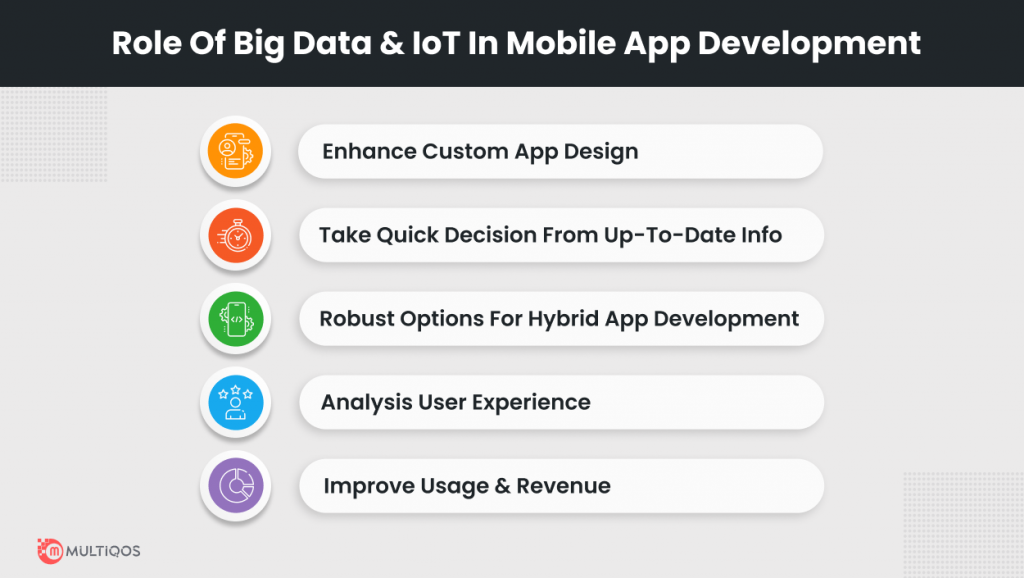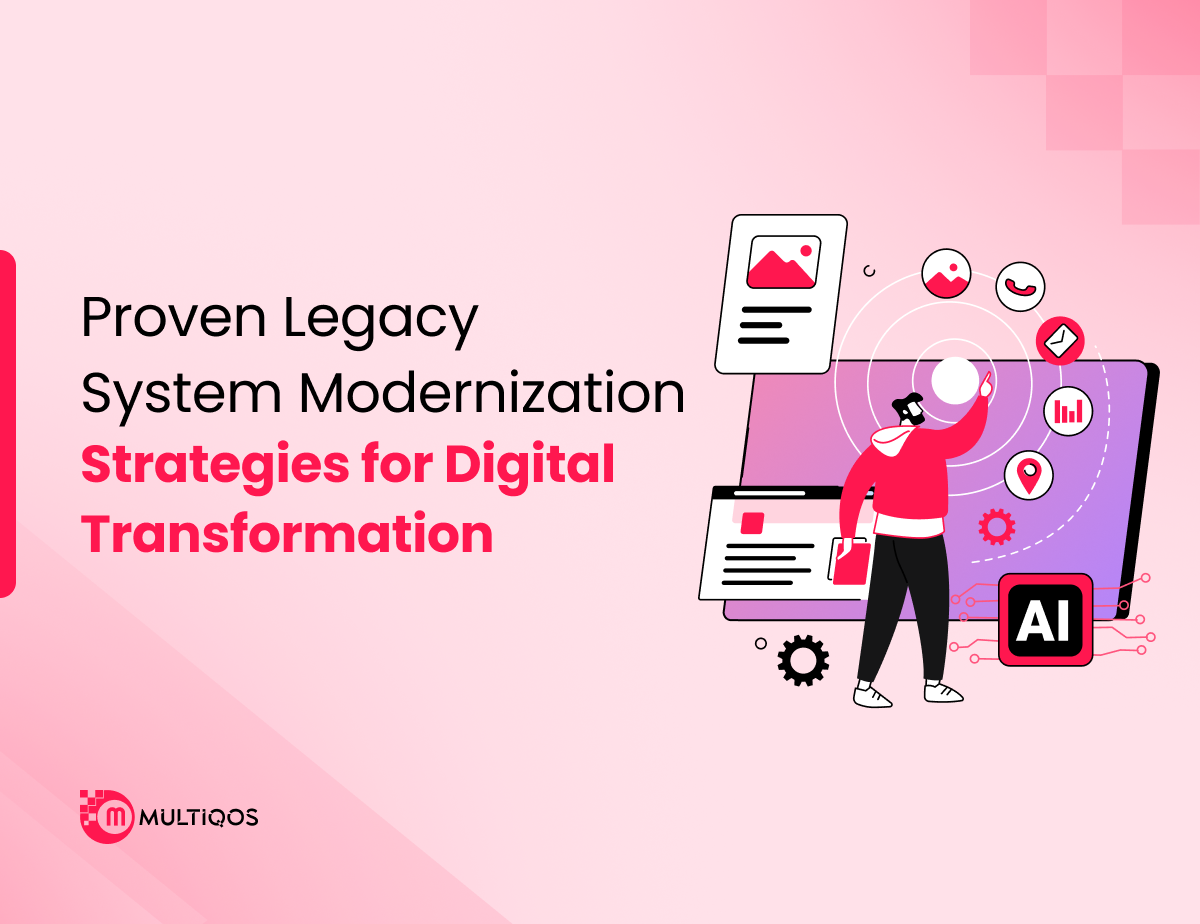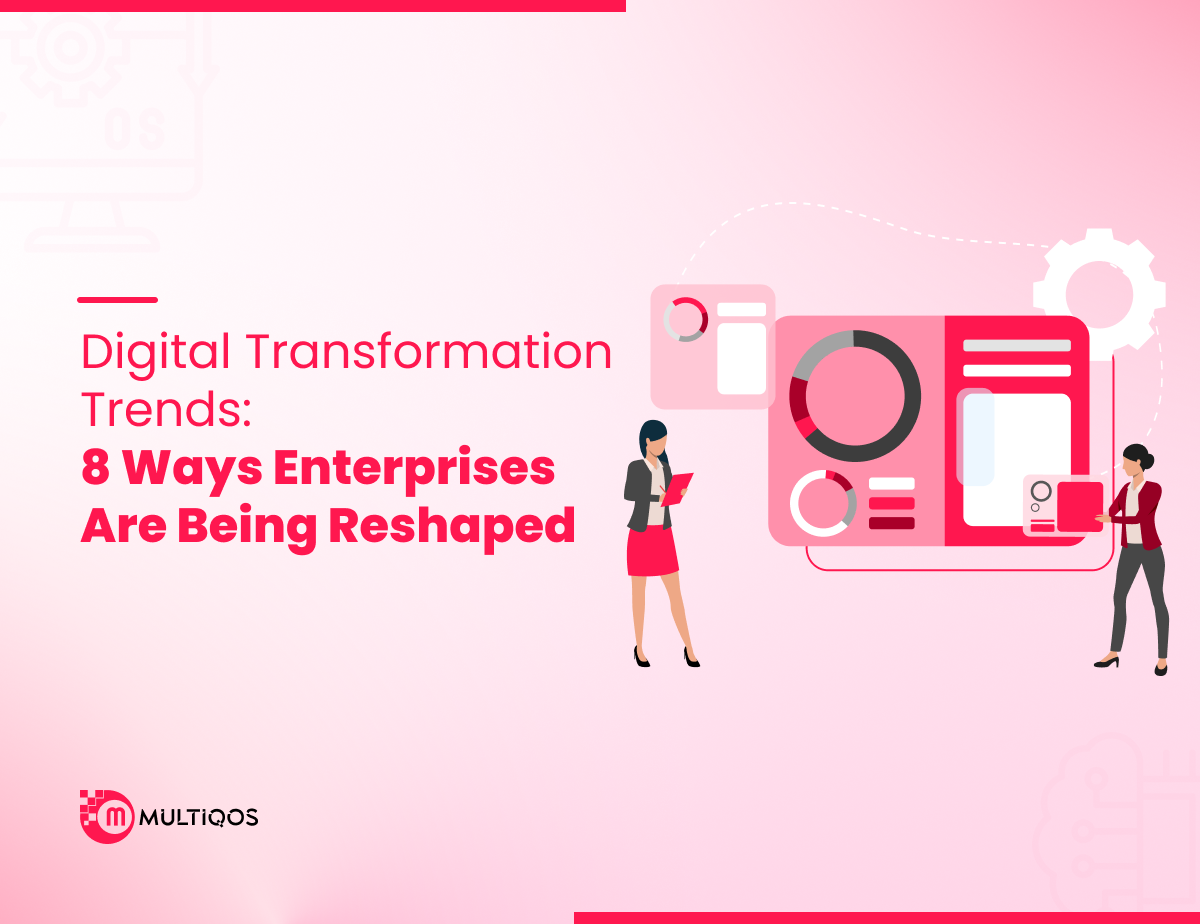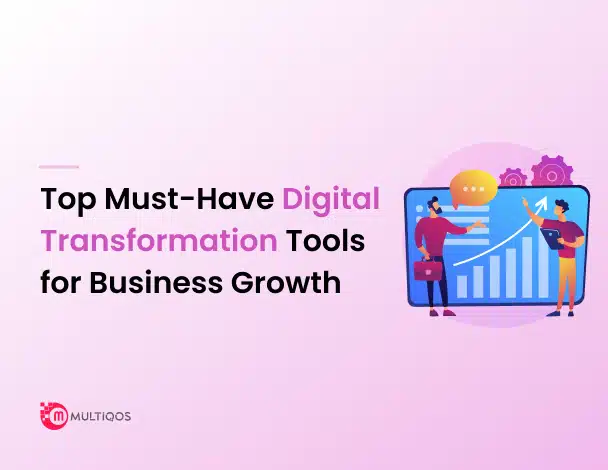How Big Data & IoT Are Changing The Mobile App Development Industry
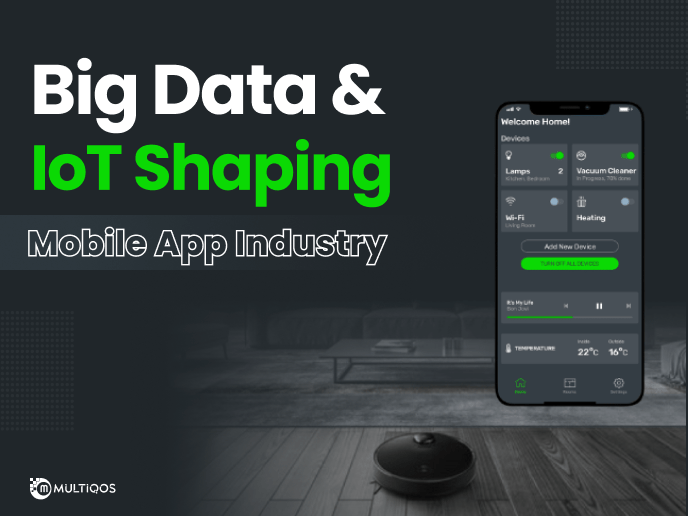
Overview
The value of having a mobile application is becoming more and more apparent to businesses of all sizes. Even if it isn’t vital to the firm’s overall strategy, the significance of an app cannot be understated when it comes to a digital transformation. Therefore, it is essential to be updated on the technical breakthroughs and developing trends driving forward the IoT app development industry to keep pace with the growing usage of mobile applications (apps). Internet of Things (IoT) and Big Data are two modern trends with disproportionately large consequences.
The huge volumes of data being collected daily are referred to as “Big Data,” and the word itself captures this phenomenon. Businesses, governments, and many other organizations all acquire data such as this and utilize it in their operations. Because of this trend, it is anticipated that the market for big data will balloon to 243 billion dollars by 2027.
The IoT and Big Data
The huge network of physical devices that exchange data over the internet is referred to as the “Internet of Things,” or Io. Personal digital assistants, Internet of Things (IoT) cameras, smartwatches, and autos with built-in sensors are a few examples of connected devices that are now available. Data is gathered and then distributed across all of the devices. In addition, they collect data that may later be used as input in Big Data systems.
The arrival of the Internet of Things has transformed the landscape of what lies ahead for the development of mobile applications. IoT, which stands for the Internet of Things, is now one of the most popular trends because of its many advantages to both app users and developers. Read on for more information on the Internet of Things and how it is used in various corporate settings.
The industry of IoT app development company has been undergoing significant and innovative alterations at a rapid pace as a direct result of the spread of new technologies. For example, the Internet of Things (IoT) is one kind of technical progress worthy of consideration. The Internet of Things has just emerged as a viable concept. Currently, people in areas as varied as healthcare, agriculture, retail, and more are using IoT technologies. There is the possibility that the Internet of Things will make interaction and communication on all scales more efficient. Because of the rising demand for these apps and the fact that they are simple to use, IoT app development services are expanding.
Big Data and the Internet of Things (IoT) are assisting app developers in producing better applications and in discovering new ways to improve their already existing apps. Investigate how the Internet of Things (IoT) and Big Data affect the app development industry.
When Big Data Meets IoT: the Interrelation Impact
Big data and the Internet of Things (IoT) are two distinct but complementary research fields, even though they are often discussed. The complicated network of various devices that collect data and send it back to a central location over the internet is referred to as the Internet of Things (IoT), a phrase used to characterize the network. With this data, analysts can provide real-time analytics for various applications, including industrial production and agricultural irrigation. However, “big data” refers to a broader category. So before we investigate how big data and internet of things connections are related, let’s begin with the fundamentals and define “big data.”
The Internet of Things (IoT), much like big data, refers to vast troves of information; nevertheless, one of IoT’s key goals is to employ concurrent analytics to support decisions made in real-time. For instance, an online store could monitor its consumers’ levels of activity and preferences over time to give content and advertising that is more relevant to their needs. In the case of autonomous cars, data cannot be kept for further examination at a later time. If there are early warning signs that an accident is about to occur, the system must be able to gather and interpret data to take appropriate action swiftly.
Edge data processing is becoming more popular in some sectors to reduce the time spent transmitting data. This is in contrast to the cloud-based servers that serve as the foundation of the Internet of Things. In this mode, the device may continue to process specific data on its local storage for time-sensitive activities. However, even if the Internet of Things prioritizes real-time analysis and action, effective data approaches may still be effective for particular jobs. For instance, predictive analytics compiles the database of information necessary to anticipate imminent problems by taking into account the performance of a machine and the service warnings it receives over time. Therefore, by performing routine preventive maintenance, companies can avoid the considerable expenses connected with the breakdown of their equipment.
Another significant difference between them is the credibility of the different information sources they draw from. For example, big data analytics focuses primarily on human choices, especially those made within the context of the digital environment, to forecast behaviour and uncover patterns or trends in the data. On the other hand, although the Internet of Things devices may indeed monitor and learn from data that users provide, many efforts are focused on machine-generated data and have machine-centric goals. These goals include but are not limited to achieving optimal performance from the equipment, doing predictive maintenance, and monitoring the assets.
Also Read: The Guide to IoT Development Frameworks & Best Practices
Role of Big Data and IoT in Mobile App Development
It should not come as a surprise to learn that the 5.2 billion people who use mobile phones and the 20.4 billion devices linked to the internet affect the IoT app development platform sector. By using the power of the omnipresent Internet of Things (IoT) and Big Data, developers of mobile apps are on the verge of uncovering an innovative strategy for attracting new customers for their applications. There has never been a time when there was a greater need to overcome competition and achieve success by using data to direct decision-making. Consider the following in order to show the Role of big data in app development and the Internet of Things in the process of developing mobile applications:
- Expanded personalized application design
If you create an app, you’ll be competing with millions of others that are the same. There are currently hundreds of programs that perform equivalent activities; the number of applications available in your region depends on where you live. Because of this, developing unique software has become an absolute must. It doesn’t matter how well-executed your software is; it still has to stand out from the competition.
Programmers may soon have access to the resources they need to create high-quality, one-of-a-kind applications, thanks to the Internet of Things and Big Data. The mobile app developers may discover information such as the frequency with which a particular feature is utilized, the kind of problems that users seek to solve, and even geographical details on app usage. This not only makes the production of one-of-a-kind customized apps easier, but it also ensures that the app will be able to fulfil the needs of its ideal consumer.
- Gather information that is up-to-date at all times so that swift decisions may be made based on it
Due to the quick pace of change in the IoT and mobile app development market, businesses must have access to real-time data in order to retain a competitive advantage. With the assistance of Big Data and the Internet of Things, which will give them continuous access to the most up-to-date data at their fingertips, they may be able to adjust their mobile apps to the constantly shifting circumstances of the market. This would eventually increase the company’s mobile app’s potential to produce income for the business.
- Strong Prospects for Hybrid Application Development
The Internet of Things (IoT) provides astonishing value to mobile application developers. For example, app developers for Android and iOS may use the Internet of Things to ensure that their programs can be compiled and operate on a broad range of computing and mobile platforms.
This suggests that it is better to utilize IoT in mobile app development rather than concentrating on native mobile app development or hybrid app development, owing to the platform independence characteristic of IoT. Native mobile app development and hybrid app development are also alternatives. As a consequence of this, IoT has become the industry standard for developing applications that are compatible with a variety of platforms.
- An Analysis of the Experience Provided to Users
In the last ten years, there has been a meteoric rise in the popularity of mobile application development as companies of all sizes have begun to embrace the medium. Mobile apps may make communication and connection with customers much easier. As a consequence, companies are concentrating their efforts on creating mobile applications for the future, which will be powered by big data while simultaneously satisfying the requirements of their clientele.
Customers and developers need to have clear lines of communication, and the data must make this possible. The developers are making use of Big Data in order to get additional insight into the experience of the end user. They take stock of what they’ve learned and utilize that knowledge to build plans for future improvements and overcome any difficulties they encounter. Developers can rapidly and efficiently implement new features and sites that customers value if the appropriate research is done. In addition, developers are better equipped to plan out the next set of adjustments and additions to their mobile apps in response to user input when they use big data.
- Improve both the usage of and revenue from the app.
In the last section, we saw how Big Data and the Internet of Things (IoT) might provide information on how consumers interact with a mobile app. Studying the preferences and actions of customers may help businesses come up with a strategy for increasing the number of conversions and hire app developers suited for the job.
For instance, businesses may glean a great deal more information about their prospective clients by having the sales manager interact with leads as they go through the sales CRM’s pipeline phases. With this information, businesses can design effective advertising campaigns and tailor their sales materials to appeal to their target audience.
What Makes Big Data & IoT a Significant Factor in Mobile App Industry?
According to the survey results, the total number of mobile app downloads is forecast to increase to 258.2 billion in 2022 from 205 billion in 2018. In addition, mobile applications are used by many individuals, resulting in the generation of significant volumes of raw data.
Advanced analytics are required whenever raw or unstructured data are used to analyze the statistics and get reliable insights regarding mobile app development costs. The use of Big Data becomes relevant in this context. For example, mobile app developers might use big data technology to gather, organize, and examine the data that users provide about their preferences. Then, programmers may design innovative new mobile applications for the future with the assistance of insights offered by big data. IoT devices help collect data from consumers and analyze them for actionable awareness. These aid developers in producing market-impacting apps that are both user-friendly and productive.
Application development company often employ big data technologies such as Hive, Cloudera, Hadoop, Tableau, and Spark. These are just a handful of the many options available. By using these technologies and putting in new features, app developers may be able to create more powerful mobile applications.
Final Note
It should come as no surprise that nowadays, mobile apps are at the centre of all efforts made by corporations to improve their communication. As a result, the revenue generated by the mobile app development company in india is expected to reach $189 billion this year, according to forecasts. In addition, businesses related to the Internet of Things (IoT) are anticipated to produce a total of $1.6 trillion in revenue by that year.
Remarkably, big data and the internet of things can collaborate to enhance app performance and take user engagement to new heights. Big Data uses the information obtained via the creation of IoT apps by extracting valuable insights businesses can utilize to enhance their mobile applications. Corporations may employ these insights. Put an end to the practice of neglecting either of these two technologies and start integrating them into the process of developing mobile apps for your organization.
Redy to Build IoT App Development?
We build advanced IoT applications to enhance efficiency, accuracy, and cost reduction.
FAQs on IoT and Big Data in Mobile App Development
Devices participating in the Internet of Things provide data that may be mined for insights. The Internet of Things (IoT) refers to a network of interconnected computing devices, sensors, and other “things” that collect data for subsequent analysis.
Management of the supply chain is a multi-stage process. For example, putting the Internet of Things sensors in cars enables tracking and route optimization. You may also put them in warehouses to keep tabs on stock, cut down on theft, ensure everything is held at the right temperature, and more.
Big data is one of the digital technologies that will determine the future of mobile apps. Given the importance of big data in today’s mobile app industry, it seems likely that this trend will continue. As a result of its superior functionality and user-friendliness, it has rapidly become a standard component of the mobile app market. By 2020, the mobile app market is projected to generate more than $581.9 billion in revenue. This is often due to a general trend toward growth in mobile app use.
Get In Touch

